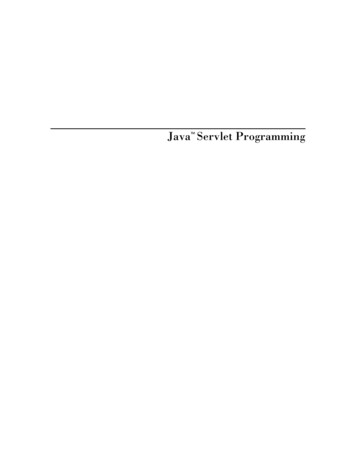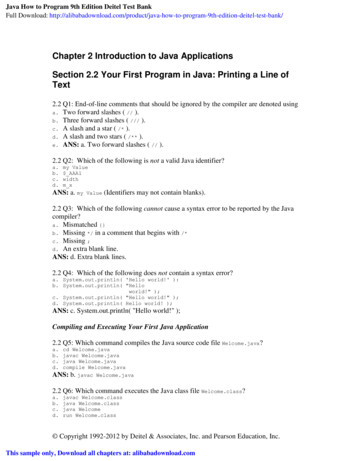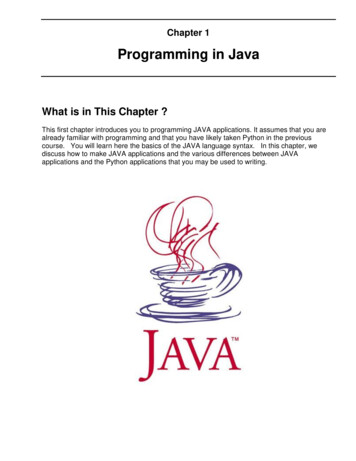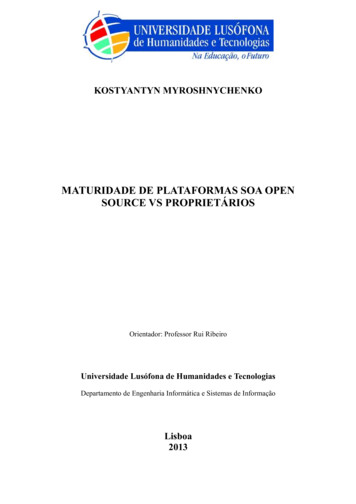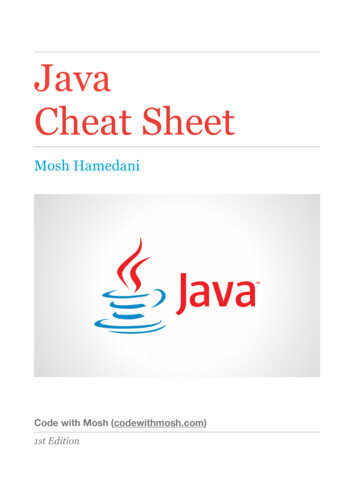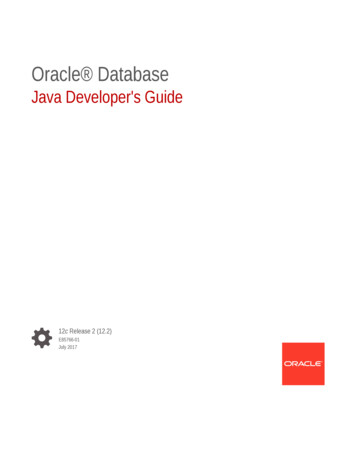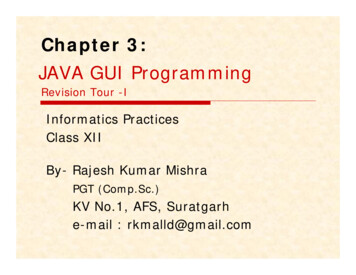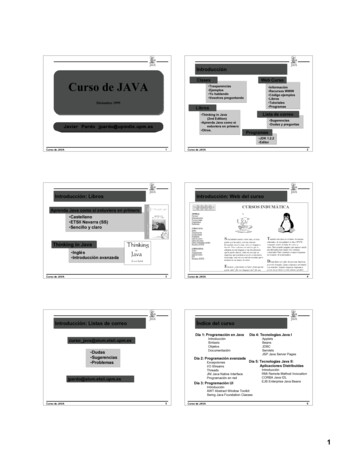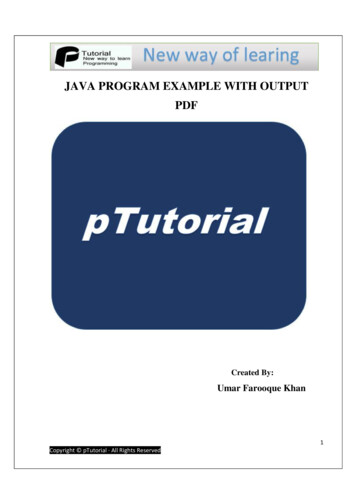
Transcription
Java CompatibilityProcessCompatibility andTCKsMikhail GorshenevSan Francisco 5 May 2008
What is Compatibility? Assurance that a Technology implementationis conformant to its specification Compatibility provides assurance: Implementations match the specification Implementations all meet (at least) a minimum levelof quality Specifications, rather than implementations, defineprogrammatic behaviour2Confidential 2006 Sun Microsystems
Why do we care about Compatibility? Promotes value in the Java brandProvides assurance of application portabilityEnsures a level playing field for all implementersProvides assurance to end users that all “required” (i.e.guaranteed) functionality is present Enables developers to write to a specification ratherthan to an implementation Improves (over time) the quality of the specification3Confidential 2006 Sun Microsystems
What Defines a Java Technology in JCP?Specification Defines API requirementsReference Implementation (RI) Proves the spec can be implementedTechnology Compatibility Kit (TCK)Ensures all implementations are conformant to thespecification4Confidential 2006 Sun Microsystems
Why are all Three Parts Required?SpecificationIs specificationunambiguous?TCKCan you build animplementation?Is TCK correct?Is RI conformant?ReferenceImplementationEach supports the others during development5Confidential 2006 Sun Microsystems
Specification A Specification should be complete and accurate Specifications have 3 audiences: Developers Licensees/Implementers TCK developers6Confidential 2006 Sun Microsystems
Specification Spec writing guidelines Use javadoc “Think assertions” “Think testable” Optional is bad (i.e., “may” rather than “must”) RFC 2119 W3C QA and Conformance Working Group havepublished specification writing guidelines (http://www.w3.org/QA/WG/)7Confidential 2006 Sun Microsystems
What Is a Technology Compatibility Kit (TCK)? The suite of tests, tools and documentation thatallows the implementer of a specification todetermine if their implementation is compliantwith that specification. Only compatible implementations (i.e., those thatpass their TCKs) can be distributed to customers Passing is more than just passing the tests Compatibility requirements are defined by the TCK8Confidential 2006 Sun Microsystems
What Is a Technology Compatibility Kit (TCK)? Spec Lead responsibilities Development Licensing terms Maintenance Lead responsibilities Appeals Process TCK updates9Confidential 2006 Sun Microsystems
What Makes Up a Typical TCK? Test Suite Tests Test Framework Exclude List Test Harness Documentation TCK Users' Guide How to Run the Test Suite Compatibility Requirements Appeals Process Supporting Tools Documentation10Confidential 2006 Sun Microsystems
Test Suite Tests Designed to demonstrate and verifyimplementation compliance to its specification Test framework Defines the particular test environment used bythe test harness to run the tests and collect testresults11Confidential 2006 Sun Microsystems
Test Suite Exclude List Provides a means to remove invalid tests Invalid tests are: Test has bugs Spec item covered by test is ambiguous Test does not match spec Test assumes unreasonable hardware/software requirements Test is biased to a particular implementation12Confidential 2006 Sun Microsystems
Documentation TCK Project Planning and Development Guide Rationale and examples for TCK development TCK project scoping information Java Technology Test Suite Development Guide Techniques for test development TCK User's Guide template Example documentation for TCKs Compatibility requirements, appeals process, etc. Latest versions available at tools13Confidential 2006 Sun Microsystems
Test Harness Tool to automate testing of an implementation fortest: Selection Scheduling Execution Reporting Assures all required tests are run and pass Tests can easily be rerun for debugging purposes Manages testing process without introducinghuman error14Confidential 2006 Sun Microsystems
Compatibility Requirements Defines how to “pass” the TCK Definitions and Rules listed in the TCK User'sGuide identify: Criteria for successfully passing the test suite Example: All required tests must pass Non-testable criteria that must be assured by theimplementer. For example: Tests cannot be changed by the implementer Implementations cannot deviate from the specificationwhere functionality isn’t explicitly tested15Confidential 2006 Sun Microsystems
Compatibility Requirements Criteria for Signature Test These rules evolve over time and vary by Technology Language standardized through use of templates16Confidential 2006 Sun Microsystems
Appeals Process The process defined by the Spec Lead that allowsimplementers of the Specification to challenge one ormore tests defined by the Specification's TCK The appeals process should identify: Who can make challenges to the TCK What challenges to the TCK may be submitted How these challenges are submitted How and by whom challenges are addressed How accepted challenges to the TCK are managed17Confidential 2006 Sun Microsystems
New TCK Requirements (for JCP 2.6)JCP 2.6 identifies new requirements for TCKs tobetter ensure commonality of coverage andquality of TCKs across all JSRsNew requirements include:Licensing terms provided to EC at each reviewDocumentation (for review by EC at Final ApprovalBallot)100% Signature coverage for APIsTest Harness to automate testing and reportingTCK Coverage Document18Confidential 2006 Sun Microsystems
TCK Coverage Document (new for JCP 2.6)The TCK Coverage Document (TCD) An xecutive summary (one or two pages) included in FABmaterials to assist the EC in evaluating the TCKThe TCD includes:Overview of the TCK documentationDescription of means used to validate TCK qualityDescription of means used to validate TCK coverageTest coverage numbersJustification for the adequacy of the TCKQuality and coverage19Confidential 2006 Sun Microsystems
TCD Example (from Spec Lead Guide)TCK Coverage Document for JSR-xxx: Wombat API (Optional Package for Java SE)TCK ComponentsUser's Guide Compatibility RulesConfiguration instructionsTest Suite API Tests Signature Test Framework code Configuration Interview20 TM HarnessJavaTestConfidential 2006 Sun Microsystems
TCD Example (continued) Terminology of MetricsAssertion: A specific statement of functionality or behavior required by aspecification. A testable assertion is one that can be validated in animplementation by testing.Test: A binary application, data or script comprised of one or more Test Cases.Test Case: A single set of test inputs, execution conditions, and expected resultsdeveloped to verify an implementation's conformance with a specific assertion.Assertion Breadth Coverage: Ratio of all assertions tested by at least one testcase to the total number of testable assertions defined by the specification.Assertion Depth Coverage: For all assertions tested by test cases, the ratio ofthese test cases to the total number of test cases needed to completely test theassertions (assertions may require multiple test cases to adequately verifyconformance to the specification).Method Coverage: Ratio of methods directly exercised by test cases to the totalnumber of methods defined by the specification.21Confidential 2006 Sun Microsystems
TCD Example (continued)CoverageTotal testable assertions: 426 as identified through the use of the Java CTTSpec Tractool and hand markup (hand markup was required for the two referenced specifications) Tests: 304 tests (comprising 627 test cases)Assertion BreadthCoverage:70% as measured by Spec Trac and 65% estimated for both referenced specificationsAssertion Depth Coverage: Approx. 50% (estimated by sampling)Assertion Breadth Coverage varies by package and ranges from 30% to 95%Assertion Breadth Coverage of the Wombat data exchange protocol is estimated to be 90%22MethodCoverage (static): 94% as measured by the Java CTT od Coverage (runtime against the RI): 97% as measured by XYZ code coverage utility
TCD Example (continued)Quality AssuranceTCK was run using representative configurations of the ReferenceImplementation on the following platforms: Red Hat Linux/Sun Java SE v1.3.1 and 1.4.2Windows 98, 2000, XP/Sun Java SE v1.3.1, 1.4.2Solaris 9/Sun Java SE 1.4.1Mac OS 10.2.6/Apple Java SE v1.4.2Code quality was demonstrated through use of code reviews and inspectionsUser's Guide was constructed from the Java CTT TCK User's Guide templateDocumentation instructions and Configuration Interviews were exhaustivelyverified and tested23Confidential 2006 Sun Microsystems
TCD Example (continued)Justification of Adequacy As the first major release of this specification, thecoverage is good and consistent with the coverage ofsimilar JSRs at this level of spec maturity. Coveragevariance is due to effects of late spec changes and theavailability/cost of test development resources.Emphasis was given to covering critical spec areas asidentified by the Spec Lead and Expert Group. We planto increase coverage in weak areas during the nextmajor specification update release.24Confidential 2006 Sun Microsystems
Scoping a TCK Project TCKs are not trivial to produce, so BeginEarly! Define the level of assertion coverage desiredand plan adequate resources and time Creating a good TCK will require about thesame amount of effort and time as the RI Take advantage of the Spec-RI-TCK triangle25Confidential 2006 Sun Microsystems
Test Development Several levels of conformance testing coverage: Signature - checks completeness Method - checks basic functionality Assertion - checks required behaviour Must have 100% signature coverage Strive for 100% method coverage Goal should always be to provide as muchassertion coverage as possible26Confidential 2006 Sun Microsystems
Assertion Statement which specifies some necessary aspect of the API Assertion attributes testable required not an assertion (e.g., example text) optional implementation-specific Example 1: java.lang.Integer.toString(int i, int radix) method description “If the radix is smaller than Character.MIN RADIX or larger thanCharacter.MAX RADIX, then the radix 10 is used instead.” Example 2: java.lang.Runtime.exit(int Status) method description “Terminates the currently running Java Virtual Machine.This method never returns normally”.27Confidential 2006 Sun Microsystems
Assertion Coverage%Percentage of testable assertions covered by theTCK tests%Industry expects 100% assertion coverage formature specifications%Need perfect spec and RI to achieve 100%%75% assertion coverage is a good practical targetfor most new TCKs%Very unlikely to achieve even 20% if TCKdevelopment is started too late28Confidential 2006 Sun Microsystems
What Materials does Sun Provide? In May 2001, Sun released "Java CompatibilityTechnology Tools" for use within JCP: Java Compatibility Test Tools (under license) JavaTestTM Harness Spec Trac, Sig Test, API Cov Documentation TCK Project Planning and Development Guide Java Technology Test Suite Development Guide TCK User's Guide template User Guide's for all the tools See http://jcp.org/resources/tdk29Confidential 2006 Sun Microsystems
Java ME TCK Framework Set of JavaTest plug-ins for the Java ME platform Support for Java ME profiles and configurations (CLDC, CDC, FP/PBP/PP, MIDP) Agents for Java ME application models (main, Xlet, MIDlet, Applet) Test deployment infrastructure (application provisioning) Redistributable binary available at no cost tools Based on open-source ME Framework software https://meframework.dev.java.net/ Java ME test examples Developer's Guide explains Java ME-specific aspects oftest suite creation30Confidential 2006 Sun Microsystems
Documentation TCK Project Planning and Development Guide Rationale and examples for TCK development TCK project scoping information Java Technology Test Suite Development Guide Techniques for test development TCK User's Guide template Example documentation for TCKs Compatibility requirements, appeals process, etc.31Confidential 2006 Sun Microsystems
JavaTest Sun's test harness for testing Java API compatibility Based on open-source JTHarness software https://jtharness.dev.java.net/ Flexible test sequencing and reporting tool for all kindsof Java API compatibility testing Configurable to most product testing environments anddevices Binary is redistributable at no cost for JCP TCKs Java Test Architect's Guide explains configuring testsuites to operate under JavaTest32Confidential 2006 Sun Microsystems
Spec Trac Automatic way of tracking assertions in a specification Calculates coverage for a package or API Number of assertions tested Percentage of assertions tested Highlights differences between revisions of a specificationusing the GUI Tracks tests which need change as a result of a revisedspecification GUI interface – allows for manual markup of an assertionand classification of that assertion33Confidential 2006 Sun Microsystems
Sig Test Tool to create a signature tests Open-source development https://sigtest.dev.java.net/ Verifies correctness of API signature Members and attributes of the API Equality of API member sets34Confidential 2006 Sun Microsystems
API Coverage Tool to measure the member coverage of a TCK Much less precise than assertion level coverage Shows breadth but not correctness of coverage Calculates percentage of methods, fields andconstructors defined by the specification that aredirectly invoked by a TCK Uses static analysis to determine coverage 95 % should be target for most TCKs35Confidential 2006 Sun Microsystems
Training Course Key parts of the TCK Development Guidelinesand the Test Suite Development Guide havebeen captured in a web-based training course. If interested (it's free), please send mail to:tsdg course beta@sun.com36Confidential 2006 Sun Microsystems
Summary TCKs are a valuable tool fordevelopment of specification and reference implementations Passing a TCK requires more than just passing the tests (i.e.,passing is defined by the compatibility requirements) Plan your TCK project and begintest development early to ensure a strong test suite Strive for high test assertion coverage Take advantage of Sun's test development tools37Confidential 2006 Sun Microsystems
Thank You!http://jcp.org
Java ME TCK Framework Set of JavaTest plug-ins for the Java ME platform Support for Java ME profiles and configurations (CLDC, CDC, FP/ PBP/PP, MIDP) Agents for Java ME application models (main, Xlet, MIDlet, Applet) Test deployment infrastructure (application provisioning)
